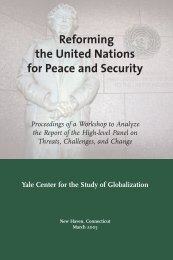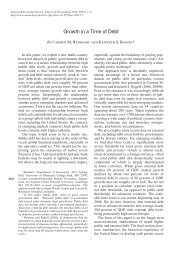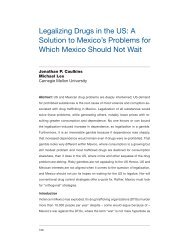The collapse of global trade, murky protectionism, and the crisis:
The collapse of global trade, murky protectionism, and the crisis:
The collapse of global trade, murky protectionism, and the crisis:
Create successful ePaper yourself
Turn your PDF publications into a flip-book with our unique Google optimized e-Paper software.
<strong>The</strong> <strong>collapse</strong> <strong>of</strong> <strong>global</strong> <strong>trade</strong>, <strong>murky</strong> <strong>protectionism</strong>, <strong>and</strong> <strong>the</strong> <strong>crisis</strong><br />
barriers have come down a great deal already but <strong>trade</strong> performance in most African<br />
countries has not improved. O<strong>the</strong>r factors such as <strong>the</strong> investment climate, transport<br />
infrastructure, ports, customs, competition policy, skills <strong>and</strong> macroeconomic policies<br />
are also crucial for <strong>the</strong> success <strong>of</strong> efforts to scale up <strong>trade</strong> in Africa. <strong>The</strong>se reforms will<br />
require assistance, including Aid for Trade. Under <strong>the</strong> leadership <strong>of</strong> <strong>the</strong> WTO, significant<br />
progress has been made in mobilising Aid for Trade. However, it is also important<br />
for African countries to be proactive in designing a coherent set <strong>of</strong> policy options<br />
targeted to <strong>the</strong>ir own development objectives.<br />
<strong>The</strong> Aid for Trade initiative must also complement <strong>and</strong> streng<strong>the</strong>n Africa's regional<br />
integration efforts. <strong>The</strong> African Development Bank <strong>and</strong> o<strong>the</strong>r pan-African institutions<br />
have an important role to play in advancing this agenda. <strong>The</strong> African<br />
Development Bank, in particular, has a comparative advantage through its core programmes<br />
in physical infrastructure <strong>and</strong> private sector development, which definitely<br />
advance <strong>the</strong> Aid for Trade agenda.<br />
For its part, <strong>the</strong> G20 should continue to recognise that it takes decades to build productive<br />
capacity that is effective <strong>and</strong> sustainable. <strong>The</strong>refore, Aid for Trade needs to<br />
involve long-term assistance programmes, especially, predictable aid flows which can<br />
be fed into budgeting processes. More importantly, Aid for Trade must be a complement,<br />
not a substitute, for working towards a more progressive <strong>and</strong> open world trading<br />
system, one which does not prejudice <strong>the</strong> interests <strong>of</strong> developing countries. <strong>The</strong><br />
<strong>global</strong> economic <strong>crisis</strong> should not distract <strong>the</strong> G20 <strong>and</strong> any donor from supporting<br />
long-term improvements in Africa's supply side capacities, so unlocking <strong>the</strong> continent's<br />
<strong>trade</strong> potential.<br />
<strong>The</strong> role <strong>of</strong> <strong>the</strong> African Development Bank programs<br />
As part <strong>of</strong> its overall package <strong>of</strong> activities, <strong>the</strong> African Development Bank targets two<br />
<strong>crisis</strong>-induced <strong>and</strong> <strong>trade</strong>-related challenges:<br />
• Offsetting <strong>the</strong> decline in government revenues due to falling <strong>trade</strong> volume, <strong>and</strong><br />
• Compensating <strong>the</strong> decline in loanable funds in <strong>the</strong> banking sector, including<br />
funds available to finance <strong>trade</strong>.<br />
<strong>The</strong> African Development Bank continues to streng<strong>the</strong>n its lines <strong>of</strong> credit, <strong>of</strong>fers<br />
budget support to narrow government financing gaps, supports long-term private sector<br />
lending, <strong>and</strong> is establishing a Trade Finance Facility to address issues that emerge<br />
from <strong>the</strong> liquidity constraints. Fur<strong>the</strong>r initiatives by <strong>the</strong> African Development Bank<br />
<strong>and</strong> o<strong>the</strong>r MDBs include <strong>the</strong> now operational Fragile States Facility <strong>and</strong> <strong>the</strong> planned<br />
establishment <strong>of</strong> an Emergency Liquidity Facility.<br />
<strong>The</strong> Bank is also committed to promoting a successful conclusion <strong>of</strong> <strong>the</strong> Doha<br />
Round negotiations by supporting <strong>the</strong> voice <strong>and</strong> participation <strong>of</strong> African countries, to<br />
consolidate solid domestic reforms, <strong>and</strong> avoid policy reversals such as those associated<br />
with <strong>trade</strong> <strong>protectionism</strong>. Discussions at <strong>the</strong> G20 around <strong>trade</strong> issues may inform<br />
strategies by African governments, <strong>the</strong> African Development Bank, <strong>and</strong> o<strong>the</strong>r international<br />
agencies.<br />
Conclusion<br />
<strong>The</strong> <strong>global</strong> slowdown threatens Africa's recent economic progress. Sustained protec-<br />
33





